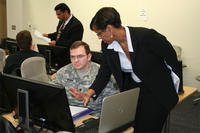I had the perfect job. As the automotive and real estate editor for The Shreveport Times, I received a new car or truck each week to test drive. I drove luxury autos, sports cars, SUVs, pickup trucks, vans, and sedans - all brand-new. Each week I was handed the keys to yet another new vehicle - accompanied by a full tank of gas and the envy of my friends.
My job included luxury travel to five-star hotels at the invitation of automakers eager to show me their newest vehicle lines.
At that time in 1993, few people telecommuted. I was one of the first. Working from home, I had plenty of time with my baby daughter. At night and during her naps, I could research stories, do phone interviews, and write articles. I used a sitter in the mornings to do work that couldn't be accomplished with a baby in tow.
So why did I give up this dream job after only two years? We "PCSd." Okay, we moved - permanent change of station in military speak.
Flexibility and education are my two secrets for staying employed. Being willing to try different jobs gave me a great variety of job skills which employers found appealing. My résumé includes work as a disc jockey, radio news director, and producer; one-hour photo lab clerk/processor; certified aerobics instructor; public relations professional for two hospitals, an order of Catholic Sisters, a financial services company, and a commodity organization; freelance television producer and writer; and craft business owner. I'm currently an adjunct marketing instructor.
Just like civilian families, our military family of five needs two incomes. According to Department of Defense figures, nearly 75 percent of military spouses work. While this number is about 10 percent less than their civilian counterparts, dual income military families, like mine, are the norm.
|
Traditional Career Pays Off
In hindsight, I might have originally chosen a higher-demand career field like Air Force wife Shanta Lima did. However, when Lima picked nursing as her occupation, she didn't know her future husband would be career military. Nursing offered Lima a good salary, flexible scheduling, and a variety of professional experiences.
"My mother is a nurse and she always guided me in that area," says Lima. "There is always a high demand for nurses."
She married her high school sweetheart, TSgt. Eduardo Lima Jr., while receiving her nursing degree. During her husband's 12 years as an air traffic controller, the couple moved only once - 12 years ago from New Jersey to Vance Air Force Base in Enid, Okla. In both locations, Lima easily found nursing positions. She currently is the clinical coordinator of St. Mary's Regional Medical Center's rehabilitation unit.
Although stationed at one base for nearly a decade, Lima's husband had several remote assignments, including one recently to Bosnia. A benefit of such a long assignment is that she has been able to participate in employer sponsored retirement programs. Spouses who move every few years don't stay in a location long enough to be vested in retirement plans.
When she first began nursing, she worked part time. Now that her children, Alycia (14) and Eduardo III (10), are in school full time, Lima is back at work full time.
"I have to be honest," she says, "being a working military spouse hasn't been much of a challenge. Nursing has allowed me the flexibility to balance work and home."
Pick a Portable Career
Spouses in traditional, high-demand careers - like nursing and teaching - generally relocate easily (although professional careers like these often require obtaining new state licensing for each move). But traditional careers aren't the only option. Some spouses decide to start businesses that can be transferred from state to state.
Richard Beaudette found a portable career was just a mouse-click away. He worked at several different jobs in retail, Internet, and telecommunications while trailing his wife Rebecca's military career. Following a successful battle with thyroid and colon cancer, Beaudette found himself unemployed, homebound, and trying to make ends meet on his wife's salary.
"My wife was in college, and my oldest son wanted a video game that cost $50 in the store. Well, $50 was a lot of money," says Beaudette. "So I looked on eBay and found someone selling a package of three games. I could buy them, keep the one my son wanted, sell the other two games, and get my money back. That's how I got started selling on eBay."
Beaudette turned that initial salefour years ago into a booming eBay video game business. He often buys and fixes damaged systems to resell online. He also purchases used and new video games. Each month he sells 400 to 500 items online.
"When I started this business, my goal was to be able to get things for the house, some games or gifts, and make an income of at least $200 per week," he says. "I've far surpassed that goal." Beaudette says it wasn't difficult to set up his business. In addition to checking with the base to make certain his Internet business could operate out of their home, he had to get state and federal tax ID numbers.
When the couple moves, he has to anticipate the transfer and liquidate his inventory. The government won't move business supplies. Working from home allows Beaudette the freedom to volunteer at his sons' school and coach the boys' baseball, basketball, and hockey teams at the base youth center.
His wife is away on temporary duty five to six months each year, so Beaudette's schedule provides family stability. "I can't even imagine how topsy-turvy, upside down our lives would be if I had to work an 8-to-5 job," he says.
Not that owning a business is always easy. Beaudette works about 60 hours each week. He buys most of his products online, and finding suppliers is a constant challenge. Being a stay-at-home dad is sometimes lonely. Only about three percent of military spouses are male, and Beaudette doesn't share many interests with his female counterparts.
In spite of long hours, Beaudette says, "I can't imagine doing anything else. I can do this [eBay] with my spouse in the military. I have no doubt that no matter where we go, I can do this."
Six Tips for Trailing Spouses
- Consider high-demand careers. According to the U.S. Department of Labor, the biggest job demand is in computer-related fields. While it is possible to maintain employment in competitive fields, careers in high-demand fields like teaching or health care are more portable.
- Take advantage of education and training. Many colleges near military bases offer discounts for military families Additionally, workshops, certifications, and on-the-job training improve spouses' job seeking opportunities.
- Be creative. Just because you have a degree in education doesn't mean you have to teach school children. You may be able to land a job as a corporate trainer, a public educator for a non-profit organization, or a textbook editor.
- Use your network. Let other military spouses, your spouse's co-workers, church and school contacts, and professional organizations in your new location know you are job hunting. Many times it's who you know that helps you land a job. Your network can help you locate the "unadvertised jobs" that often fall to those with connections. Military spouses have a built-in network of acquaintances through the base. Also, don't overlook civilian employment opportunities at your new military installation.
- Polish not just your résumé, but also your cover letter. Often, a prospective employer only reads the cover letter. To make your letter stand out, avoid opening sentences such as "I'm writing to apply for XYZ position." Think about what your prospective employer needs and then show how you can meet those needs.
- Be ready for the military-related interview questions. If employers know your spouse is in the military, they're going to ask how long you'll be around. Since the average civilian employee moves every three years, you'll likely be there as long as any non-military family. Focus on your varied background and how that helps you relate to a wide range of people and circumstances, not the duration of your employment.






















